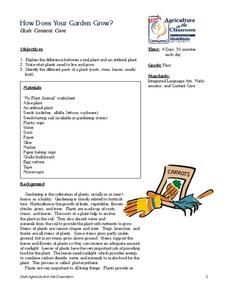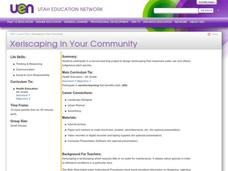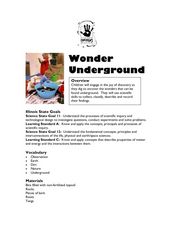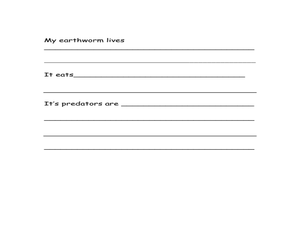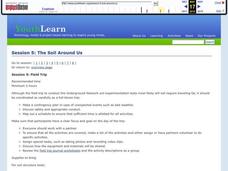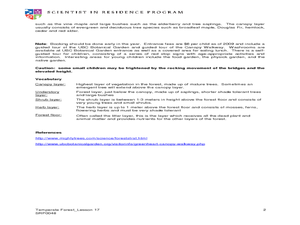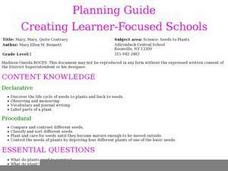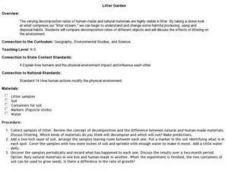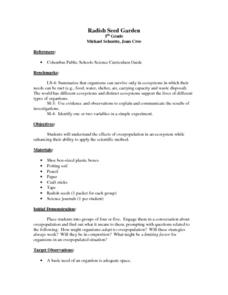Curated OER
How Does Your Garden Grow?
Students identify what plants need to grow. In this plant biology lesson, students analyze the differences between an artificial plant and a live plant. Students plant seeds and discuss what plants need to grow. Students observe the...
Curated OER
Introduction to Nutrition and Gardening
Learners examine the different parts of a plant and each ones role. In this exploratory lesson students complete several activities including a game of charades.
Curated OER
Planting Phil's Garden
Learners study how to care for plants. In this plant care activity, students observe a plant care demonstration and examine flowers using their senses. They listen to Janet Wakefield's, What If Everybody Gave? They complete a community...
Forest Foundation
Forest Health
Young foresters examine the strategies, like prescribed burns and thinning, that are employed to ensure healthy forests.
Curated OER
Let's Make a Compost Cake
Students create a compost cake. In this gardening and decomposition science instructional activity, students review and describe the "nutrient cycle." Students create a compost pile, measure and record the dimensions and temperature of...
Curated OER
Xeriscaping In Your Community
Fourth graders participate in a service-learning project. They design landscaping that maximizes water use and utilizes indigenous plant species. Afterward, they advertise and present their xeriscape garden at a school function such as...
Curated OER
Mulch
High schoolers conduct a series of experiments on mulching. In this earth science lesson, students discuss the benefits of mulching on soil. They explore how different types of mulch affect plant growth.
Curated OER
Wonder Underground
Students classify and record objects they find "underground." In this observation instructional activity, students dig into bins filled with soil and encounter various objects such as bark, twigs, etc. Students classify their findings.
Curated OER
Landscaping for Wildlife
Students identify the essential elements needed for promoting wildlife habitat. They describe the terms used in habitat design and the shelter for wildlife. Students explore how to create a pond to support wildlife and how to create a...
Curated OER
Contrasting Landscapes - UBC Farm Field Trip
Students visit the UBC Farm. For this lesson on various landscapes, students spend a day at the University of British Columbia exploring the farm and trail adjoining the campus. This lesson could be modified for use in any region that...
Curated OER
Italian-American Legacy
Learners study the role of the Italian government in the migration, also their role in farm life and poverty. They discuss how the Italians supported their families and why they exited to other countries. They discuss how to begin a...
Curated OER
Earthworms and Making a Wormery
Students explore the environment by researching insects. In this earthworm lesson, students utilize soil and plexiglass to build a see through wormery in which students can observe the worms at work. Students identify the benefits of...
Curated OER
Observing Buffers In Lakes, Ponds And Streams
Pupils observe the effects of limestone on the acidity of water. Some areas of the nation have a lot of limestone in lake bottoms and in soil, which helps neutralize the effects of acid rain. Students see this effect first hand.
Curated OER
Field Trip Preparation
Students make a contingency plan in case of unexpected events such as bad weather. They discuss safety and appropriate conduct.They map out a schedule to ensure that sufficient time is allotted for all activities.
Curated OER
Grow Your Own
Students study the growth and care of plants. They take tour of their school site and plant seeds to observe their growth. Afterward, they answer questions about the origin and value of their plants.
Curated OER
Tree Top Canopy Field Trip
Students visit the Greenheart Canopy Walkway. For this environmental lesson, students experience a coastal rain forest ecosystem. Students interact and explore the different layers of the rain forest.
Curated OER
Ag in My Community; Agriculture
Students build knowledge about agriculture as it relates to their communities' commodities. In this agriculture lesson, students brainstorm about conditions in their community with regards to growing different types...
Curated OER
Science: Seeds to Plants
First graders compare and contrast different seeds before planting them. They assess the basic needs to plants and conduct experiments of deprivation of those needs. They write stories and draw pictures of plants which are bound into a...
Curated OER
An Investigation into Effects of Rhizobium Soil Bacteria on Nitrogen Availability
Students identify the control and the variables in the experiment. They describe the growth of plants with and without nitrogen fixing bacteria, then name the bacterium responsible for making nitrogen available to the plant.
Curated OER
Litter Garden
Young scholars discuss what man-made and natural materials are visible in litter. Using a sample of litter, they review the concept of decomposition between the two types of materials. They examine the two samples once and a while and...
Curated OER
Radish Seed Garden
Fifth graders explore the effects of overpopulation in an ecosystem while applying the scientific method. They discuss overpopulation and its meaning. Students as an organism competes for space in an overpopulated area. They plant...
Curated OER
Recycling Garden Waste
Students experience how to make compost. This instructional activity is ongoing with periodic checks and maintenance. They select a piece of ground around the school or around their homes to establish a compost pile. Organic materials...
Alabama Learning Exchange
Where is the Dirt? A Lesson in Hydroponics
Students use the Internet to research hydroponic gardening which is the growing of plants without soil. They participate in an experiment where a hydroponic garden is contructed in the classroom for observaion. They recorde information...
Curated OER
Recycling by Composting
Students examine the idea of recycling by composting. Using the internet, they research the benefits of composting to the environment. In groups, they collect numbers on how much food and yard waste is produced in their community. ...
